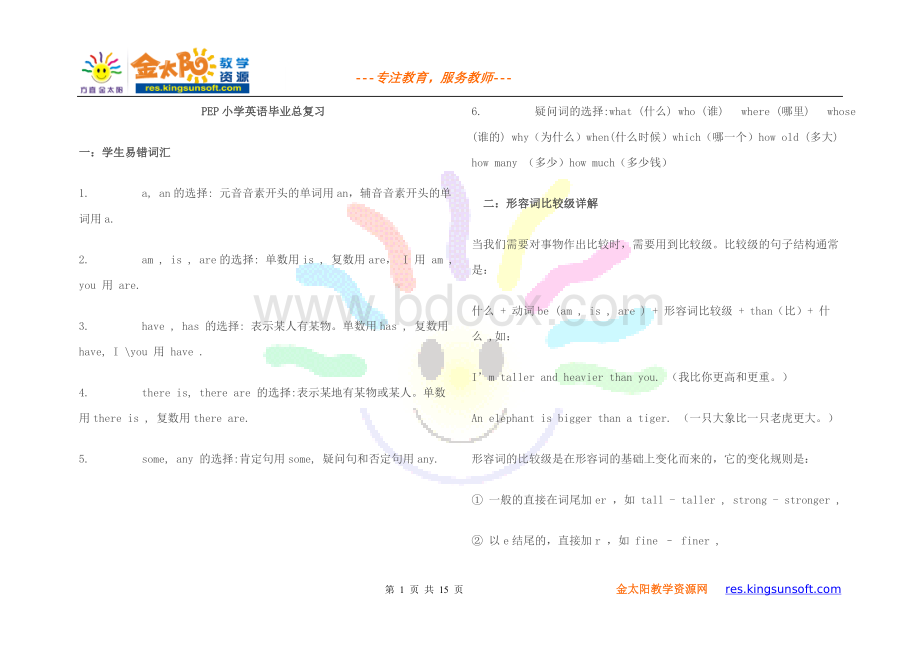毕业总复习资料-PEP小学英语六年级Word文档格式.doc
《毕业总复习资料-PEP小学英语六年级Word文档格式.doc》由会员分享,可在线阅读,更多相关《毕业总复习资料-PEP小学英语六年级Word文档格式.doc(15页珍藏版)》请在冰豆网上搜索。

some,any的选择:
肯定句用some,疑问句和否定句用any.
6.
疑问词的选择:
what(什么)who(谁)
where(哪里)
whose(谁的)why(为什么)when(什么时候)which(哪一个)howold(多大)howmany(多少)howmuch(多少钱)
二:
形容词比较级详解
当我们需要对事物作出比较时,需要用到比较级。
比较级的句子结构通常是:
什么+动词be(am,is,are)+形容词比较级+than(比)+什么,如:
I’mtallerandheavierthanyou.(我比你更高和更重。
)
Anelephantisbiggerthanatiger.(一只大象比一只老虎更大。
形容词的比较级是在形容词的基础上变化而来的,它的变化规则是:
①一般的直接在词尾加er,如tall-taller,strong-stronger,
②以e结尾的,直接加r,如fine–finer,
③以辅音字母加y结尾的,先改y为i再加er,如funny-funnier
④双写最后的字母再加er,如big–bigger,thin–thinner,hot–hotter
☆注意☆比较的两者应该是互相对应的可比较的东西。
典型错误:
Myhairislongerthanyou.(我的头发比你更长。
比较的两者是我的头发、你(整个人),那么比较的对象就没有可比性。
应该改为:
Myhairislongerthanyours.或Myhairislongerthanyourhair.
比较级专项练习:
一、从下面中选出合适的单词完成句子
heavytalllongbig
(1)How
istheYellowRiver?
(2)How
isMrGreen?
He’s175cm.
(3)How
areyourfeet?
Iwearsize18.
(4)How
isthefish?
It’s2kg.
二、根据句意写出所缺的单词
(1)I’m12yearsold.You’re14.I’m
thanyou.
(2)Arabbit’stailis
thanamonkey’stail.
(3)Anelephantis
thanapig.
(4)Alakeis
thanasea.
(5)Abasketballis
thanafootball.(贵的)
三、根据中文完成句子.
(1)
我比我的弟弟大三岁.I’m
thanmybrother.
(2)
这棵树要比那棵树高.Thistree
thanthatone.
(3)
你比他矮四厘米.Youare
thanhe.
(4)
谁比你重?
thanyou?
四、根据答句写出问句
(1)
I’m160cm.
(2)
I’m12yearsold.
(4)
Amy’shairis30cmlong.
三:
动词过去式详解
动词的过去式的构成规则有:
A、规则动词
①
一般直接在动词的后面加ed:
如 worked,learned,cleaned,visited
② 以e结尾的动词直接加d:
如 lived,danced,used
③
以辅音字母加y结尾的动词要改y为i再加ed(此类动词较少)如 study–studiedcarry–carriedworry–worried
(注意play、stay不是辅音字母加y,所以不属于此类)
④
双写最后一个字母(此类动词较少)如 stopped
B、不规则动词(此类词并无规则,须熟记)小学阶段要记住以下动词的原形和过去式:
sing–sang,
eat–ate,
see–saw,have–had,do–did,go–went,take–took,buy–bought,get–got,read–read,fly–flew,am/is–was,
are–were,say–said,leave–left,swim–swam,tell–told,draw–drew,come–came,
lose–lost,find–found,drink–drank,hurt–hurt,feel–felt
四:
动词现在分词详解
动词的ing形式的构成规则:
一般的直接在后面加上ing,如doing,going,working,singing,eating
②以e结尾的动词,要先去e再加ing ,如having,writing
③双写最后一个字母的(此类动词极少)有:
running,swimming,sitting,getting
五:
人称和数
人称代词
物主代词
主格
宾格
第一
人称
单数
I(我)
me
my(我的)
复数
we(我们)
us
our(我们的)
第二
you(你)
you
your(你的)
you(你们)
your(你们的)
第三
he(他)
him
his(他的)
she(她)
her
her(她的)
it(它)
it
its(它的)
they(他们/她们/它们)
them
their(他们的/她们的/它们的)
六:
句型专项归类
1、
肯定句:
是指用肯定的语气来陈述的句子,如:
I’mastudent.
Sheisadoctor.
Heworksinahospital.
Therearefourfansinourclassroom.
Hewilleatlunchat12:
00.
IwatchedTVyesterdayevening.
2、否定句:
含有否定词或表示否定意义词的句子,如:
I’mnotastudent.
Sheisnot(isn’t)adoctor.
Hedoesnot(doesn’t)workinahospital.
Therearenot(aren’t)fourfansinourclassroom.
Hewillnot(won’t)eatlunchat12:
Ididnot(didn’t)watchTVyesterdayevening.
☆注意☆小结:
否定句主要是在肯定句的基础上加上了否定词“not”。
有动词be的句子则“not”加在be后面,可缩写成“isn’t,aren’t”,但amnot一般都分开写。
没有动词be的句子则要先在主要动词的前面加上一个助动词(do,does,did),然后在它后面加上“not”,你也可以把它们缩写在一起如“don’t,doesn’t,didn’t)。
这三个助动词要根据人称和时态来选择,其中“does”只用于一般现在时主语是第三人称单数的情况,而“did”只用于一般过去时,不论主语是什么人称和数,都用“did”。
3、一般疑问句:
是指询问事实的句子,此类句子必须用“yes”,或“no”来回答。
如:
Areyouastudent?
Yes,Iam/No,I’mnot.
Issheadoctor?
Yes,sheis./No,sheisn’t.
Doesheworkinahospital?
Yes,hedoes./No,hedoesn’t.
Aretherefourfansinourclassroom?
Yes,thereare./No,therearen’t.
Areyougoingtobuyacomicbooktonight?
Yes,Iam./No,Iamnot.(Yes,weare./No,wearen’t.)
Willheeatlunchat12:
00?
Yes,Iwill./No,Iwillnot(won’t).
Aretheyswimming?
Yes,theyare./No,theyaren’t.
DidyouwatchTVyesterdayevening?
Yes,Idid./No,Ididn’t.
一般疑问句是在肯定句的基础上,
①把动词be调到首位,其他照写,末尾标点符号变成问号即可。
②没有动词be的句子则要在句首加上一个助动词(do,does,did)再把紧跟在后面的动词变回原形,末尾标点符号变成问号即可。
这三个助动词也要根据人称和时态来选择,其中“does”只用于一般现在时主语是第三人称单数的情况,而“did”只用于一般过去时,不论主语是什么人称和数,都用“did”。
一般疑问句有个重要的原则就是问和答要一致,即问句里的第一个单词(助动词)和简略答句里的这个词是一致的。
4、特殊疑问句:
以特殊疑问词(what,where,who,which,when,whose,why,how等)开头引导的句子。
此类句子应该问什么就答什么,不能用“yes、no”来回答。
Whatisthis?